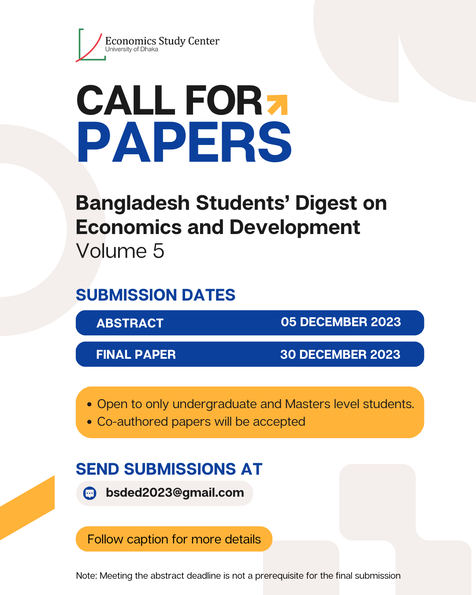ECONOMICS STUDY CENTER, UNIVERSITY OF DHAKA
BER International Economists' Conference 2024
In collaboration with Economics Study Center (ESC)
Call for Papers and Participation
Please follow the document for detailed instruction and submit your paper in the given google form.
For any queries please contact us at [email protected]
Call for Write-Ups | CETERIS PARIBUS | Volume 6
Economics Study Center (ESC) will be exploring the overarching theme of "Contemporary Global Economic Crisis and the Way out of it. (সমসাময়িক বৈশ্বিক অর্থনৈতিক সংকট এবং উত্তরণের পথ)" in the sixth edition of our annual magazine, "Ceteris Paribus." We find ourselves in the midst of challenging economic crises, marked by ongoing international conflicts and global supply chain issues. We believe that the youth have the potential to devise solutions to effectively handle these challenges and lead us through these uncertain times. Hence, ESC is inviting young writers to share their ideas and thoughts on tackling the economic issues we are currently facing. Writers can choose from a variety of sub-topics:
Entries can encompass articles or essays on the specified sub-themes, as well as poems, book reviews and satire with a focus on economics and socio-economic topics.
Deadline: 15 December, 2023
Eligibility: Entries from only undergraduate level students will be accepted.
Submission Guidelines:
For any further queries, write to us at [email protected]
- Preventing the Next Financial Crisis (পরবর্তী আর্থিক সংকট মোকাবেলা)
- Healthcare Disparity During Economic Crisis (সংকটকালীন স্বাস্থ্যখাতের বৈষম্য)
- Widening Income Inequality During Economic Crisis (সংকটকালীন বর্ধমান আয়-বৈষম্য)
- The Future of Employment and Market Economy (বাজার অর্থনীতি ও কর্মসংস্থানের ভবিষ্যত)
- Governance During Economic Crisis (সংকটকালীন শাসনতন্ত্র)
Entries can encompass articles or essays on the specified sub-themes, as well as poems, book reviews and satire with a focus on economics and socio-economic topics.
Deadline: 15 December, 2023
Eligibility: Entries from only undergraduate level students will be accepted.
Submission Guidelines:
- The articles must be between 800-2000 words.
- The article can be written in either Bengali or English.
- Submit your article to [email protected]
- The subject of the mail should be titled "Submission for Ceteris Paribus".
- Please submit your article in MS Word format.
- Font type: Times New Roman(English), Shonar Bangla/Siyam Rupali (Bangla)
- Font size: 16 for section headings, 14 for sub-headings, 12 for text, 10 for footnotes
- Bold and Italic are accepted
- Line spacing: 1.15
- Include a brief introduction, your email address, and contact information within the same Word file.
- The author can also send their picture with the article
- Co-authored submissions will be accepted
For any further queries, write to us at [email protected]
Call for Papers | BSDED Volume 5
The Economic Study Center (ESC) is pleased to announce the call for papers for the 5th volume of Bangladesh Students’ Digest on Economics and Development (BSDED). BSDED is a prestigious student journal that showcases outstanding research papers authored by undergraduate and postgraduate level students. Selected authors will also have the unique opportunity to present their research papers at the annual Bangladesh Economics Summit, organized by ESC, in the presence of distinguished guests.
Scope of Submissions:
We invite research papers in the fields of economics, development, business, and social sciences. Papers submitted may cover multiple topics within the following domains and are not limited to these specific thematic areas. We encourage diverse and innovative research contributions from undergraduate and Masters level students.
1. Economic Development and Sustainability: Economic growth, development strategies, macroeconomic policy, public finance, trade, investment, economic integration, financial markets, digital finance, financial literacy, green infrastructure, sustainable cities.
2. Governance and Power Structures: Accountability, governance, power structures within organizations, society, or state, environmental policies, conservation, climate change mitigation.
3. Labor, Social Welfare, and Environmental Justice: Labor markets, Labor rights, informal economy, MSMEs, poverty and inequality, food security, social protection, environmental justice, equitable access to resources.
4. Local Economy and Sustainability: Rural economy, agriculture, local infrastructure, local governance, sustainable development practices.
5. Migration and Mobility: Migration, remittance, brain drain, forced migration, environmental refugees, climate-induced migration.
6. Health, Well-being, and Environmental Impact: Health, nutrition, water, sanitation and hygiene, environmental health, pollution-related diseases, public health policies.
7. Education, Human Capital, and Innovation: Education, human capital development, youth, leadership, innovation, entrepreneurship.
8. Gender Equity and Socio-economic Empowerment: Gender dynamics, gender equity, socio-economic empowerment, women in STEM fields, gender gaps in technology adoption.
9. Behavioral Economics, Public Policy, and Sustainable Choices: Choice, preference, behavioral economics, behavioral public policy, sustainable consumption.
10. Energy Transition, Innovation, and Fourth Industrial Revolution: Transition to renewable energy sources, smart grid technologies, Industry 4.0, automation, energy poverty, energy economics.
General Guidelines:
Eligibility: Entries from undergraduate and Masters level students from any university in Bangladesh or other countries will be accepted.
Deadline: The extended deadline for abstract submissions is December 12th, 2023.
Final submissions for this year's edition must be received no later than December 30th, 2023, 11:59 PM. Please note that submissions received after this deadline will not be considered for review.
The abstract and main paper should be emailed to: [email protected]
Regulations for Research Papers:
Advisory Panel: Submitted papers will be rigorously reviewed by experts in the field of economics, including faculties from the Department of Economics at the University of Dhaka.
For any further queries, contact: [email protected]
Scope of Submissions:
We invite research papers in the fields of economics, development, business, and social sciences. Papers submitted may cover multiple topics within the following domains and are not limited to these specific thematic areas. We encourage diverse and innovative research contributions from undergraduate and Masters level students.
1. Economic Development and Sustainability: Economic growth, development strategies, macroeconomic policy, public finance, trade, investment, economic integration, financial markets, digital finance, financial literacy, green infrastructure, sustainable cities.
2. Governance and Power Structures: Accountability, governance, power structures within organizations, society, or state, environmental policies, conservation, climate change mitigation.
3. Labor, Social Welfare, and Environmental Justice: Labor markets, Labor rights, informal economy, MSMEs, poverty and inequality, food security, social protection, environmental justice, equitable access to resources.
4. Local Economy and Sustainability: Rural economy, agriculture, local infrastructure, local governance, sustainable development practices.
5. Migration and Mobility: Migration, remittance, brain drain, forced migration, environmental refugees, climate-induced migration.
6. Health, Well-being, and Environmental Impact: Health, nutrition, water, sanitation and hygiene, environmental health, pollution-related diseases, public health policies.
7. Education, Human Capital, and Innovation: Education, human capital development, youth, leadership, innovation, entrepreneurship.
8. Gender Equity and Socio-economic Empowerment: Gender dynamics, gender equity, socio-economic empowerment, women in STEM fields, gender gaps in technology adoption.
9. Behavioral Economics, Public Policy, and Sustainable Choices: Choice, preference, behavioral economics, behavioral public policy, sustainable consumption.
10. Energy Transition, Innovation, and Fourth Industrial Revolution: Transition to renewable energy sources, smart grid technologies, Industry 4.0, automation, energy poverty, energy economics.
General Guidelines:
Eligibility: Entries from undergraduate and Masters level students from any university in Bangladesh or other countries will be accepted.
Deadline: The extended deadline for abstract submissions is December 12th, 2023.
Final submissions for this year's edition must be received no later than December 30th, 2023, 11:59 PM. Please note that submissions received after this deadline will not be considered for review.
The abstract and main paper should be emailed to: [email protected]
Regulations for Research Papers:
- Font type: Times New Roman
- Font size: 16 for section headings, 14 for sub-headings, 12 for text, 10 for footnotes
- Bold and italic are accepted
- Line spacing: 1.15
- Paper size: maximum 5000 words
- Page numbers: top-right
- Color: black and white only
- Name the file in the format “FirstNameLastName_BSDED2023”. For example, if your name is ABCD, format the file name as “ABCD_BSDED2023”
- A research paper should contain the following sections: Abstract (not more than 200 words), Introduction, Literature Review, Methodology, Results, Conclusion and Reference
- For referencing, Harvard style should be followed
- Cover page should include the name of the author, name of institution, paper title, course, year of study, contact number and email-id
- The research papers will be considered for publishing only after being reviewed by the editorial board
- Plagiarism of any kind is strictly prohibited
- Submissions will have to be made in the following address: [email protected]
- A valid student ID will be required if the submission gets selected
- Co-authored papers will be accepted
Advisory Panel: Submitted papers will be rigorously reviewed by experts in the field of economics, including faculties from the Department of Economics at the University of Dhaka.
For any further queries, contact: [email protected]


